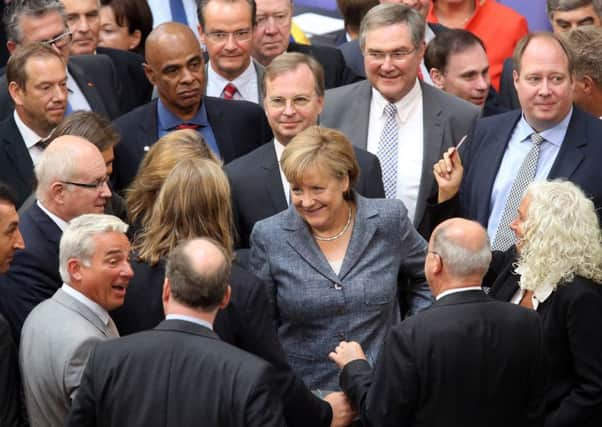German parliament approves third Greek bailout


The vote’s result also seemed to dispel any speculation that Chancellor Angela Merkel would have difficulty getting her conservative bloc to sign on. Lawmakers voted 454-113 in favor, with 18 abstentions.
German approval is among the last due from parliaments across Europe, after which Greece is expected to get the first installment of its new 86 billion euro loans package.
Advertisement
Hide AdAdvertisement
Hide AdThe country needs the cash to make a debt repayment today. The board of the European bailout fund that will disburse the money were set to hold a teleconference last night to discuss the matter. The German approval was never in doubt but in a similar vote last month, 60 members of Mrs Merkel’s conservative bloc voted against and some local media had speculated that even more could rebel this time as Germans are increasingly sceptical about giving Greece more money.
Though a party-breakdown of the vote was not immediately available, the result suggested that if anything, more of Mrs Merkel’s lawmakers voted in line with her recommendation
German Finance Minister Wolfgang Schaeuble, a senior member of Mrs Merkel’s Christian Democratic Party who has been one of the harshest critics of Greece, may have helped the cause as he lobbied hard ahead of the vote for the passage of Greek’s third bailout in five years.
Mr Schaeuble told lawmakers that approval of the three-year loan package is “in the interest of Greece and the interest of Europe.” He noted that the Greek government has taken big steps over the past few weeks to restore trust with its creditors.
Mr Schaeuble conceded that voting in favour of the bailout wasn’t an easy one for him, but that “it would be irresponsible to not use the chance for a new beginning in Greece” in light of the fact that the Greek parliament has already backed a large chunk of reform measures demanded by creditors.
Germany is the largest single contributor to the bailouts and many in Mr Schaeuble’s party remain sceptical. Mrs Merkel’s coalition partner, the Social Democrats, and the opposition Greens also backed the deal.
In the Netherlands, lawmakers interrupted their summer recess to debate the Dutch government’s support for the Greek bailout.
Geert Wilders, the anti-Islam lawmaker who is also a staunch opponent of the European Union and financial support for Greece, opened the debate by calling Prime Minister Mark Rutter “the Pinocchio of the Low Countries” for breaking an election pledge not to approve another bailout.